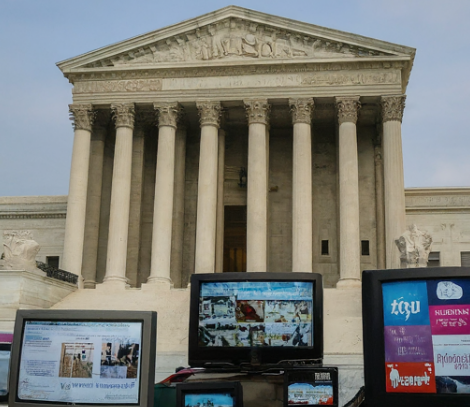This week, the U.S. Supreme Court is going to decide on a big issue that could change how we use social media. They are looking at two cases that might give states like Texas and Florida more power over what can be posted on platforms like Facebook, TikTok, and YouTube.
The main question is: Should these social media companies be able to choose what content is allowed on their sites, including what can be taken down?
‘Does Big Tech have a right to censor or “deplatform” you for political speech it does not like? The US Supreme Court will consider that question today in arguments involving laws enacted by FL and TX designed to protect individuals from political censorship.’ Ron DeSantis – see fast clip below
Does Big Tech have a right to censor or “deplatform” you for political speech it does not like?
The US Supreme Court will consider that question today in arguments involving laws enacted by FL and TX designed to protect individuals from political censorship. pic.twitter.com/59yiavqyq4
— Ron DeSantis (@GovRonDeSantis) February 26, 2024
Texas and Florida want to stop these platforms from deleting posts, even if they contain harmful content like hate speech or false information about elections. This is a big deal because it involves the First Amendment, which is about free speech.
If the Court agrees with the states, it could affect how we get information about important things like the 2024 elections on social media sites from Instagram to Twitter.
Texas and Florida say their laws are about controlling how these companies do business, not about limiting free speech. However, groups like Left wing NetChoice, which is fighting against these laws, argue that this goes against the social media platforms’ own rights to free speech and could have lots of unexpected negative effects.
Today, the Supreme Court is hearing a set of landmark free speech cases While my case concerning government censorship, MO v. Biden, is slated to be argued March 18, the cases today also concern Big Tech censorship. Proud to have submitted a brief today. – Fox News
For example, some experts are worried that these laws could force social media sites to treat all types of speech the same, even if some of it is dangerous or threatens election officials.
The Supreme Court’s decision will also look at whether people can sue social media companies if they feel their posts were wrongly taken down.
Both Texas and Florida claim their laws are to prevent social media sites from unfairly targeting conservative views, even though the platforms say they don’t discriminate based on political beliefs.
The Supreme Court will hear two cases Monday on laws passed in Florida and Texas that target purported “censorship” by social media companies—which could broadly impact how social media giants can be regulated and what information users see online. – Forbes (vid below)
The Supreme Court will hear two cases Monday on laws passed in Florida and Texas that target purported “censorship” by social media companies—which could broadly impact how social media giants can be regulated and what information users see online. pic.twitter.com/H1EmXBWQGp
— Forbes (@Forbes) February 26, 2024
Florida’s law, for instance, says social media can’t ban political candidates and allows people to sue if they think they’ve been unfairly censored. Texas has a similar law that stops social media from blocking or discriminating against posts.
The argument is about whether we need new laws to make sure social media platforms respect free speech, even though the First Amendment usually applies to the government, not private businesses.
The tech industry says these laws go against their right to decide what content they allow.
Different lower courts have had mixed opinions on this issue.
For example, one court said social media companies can’t just censor anything they want, but another court said Florida’s law probably goes against the First Amendment because it forces platforms to host certain speech.
Now, it’s up to the Supreme Court to clear up this disagreement.
Dr. Peter McCullough talks with Tommy about the upcoming supreme court case on censorship. full interview below
Dr. Peter McCullough talks with Tommy about the upcoming supreme court case on censorship.
full interview below pic.twitter.com/Kp7mo44op0
— DrRay (@DrNoMask) February 24, 2024
Some Quotes
- “In the age of information, ignorance is a choice.” – Donny Miller
- “The human right to freedom of expression is crucial for the creation, development, and exchange of ideas at the heart of the internet’s power for good.” – Tim Berners-Lee. As the inventor of the World Wide Web, Berners-Lee highlights the fundamental role of free expression online and its contribution to societal progress.
- “Social media is not just an activity; it is an investment of valuable time and resources.” – Sean Gardner
- “The price of freedom of speech is that we must put up with a good deal of rubbish.” – Robert G. Ingersoll. Ingersoll’s words underscore the delicate balance between protecting free speech and navigating the challenges it brings, such as misinformation and harmful content.
Links – Comments – More
- From@WSJopinion : Florida and Texas want government to police free speech on social-media platforms. That never turns out well and it violates the First Amendment. – Wall Street Journal
- The Supreme Court is set to hear arguments today on whether Big Tech companies have a constitutional right to censor other people. Reminder: Big Tech censorship got Joe Biden elected in 2020. Fox News
- This morning the Supreme Court is hearing oral arguments in one of two massive cases regarding Big Tech censorship this term — NetChoice v. Paxton. The case concerns Texas law to bar viewpoint discrimination, mandate that platforms disclose info about their “moderation” practices, and require that users have the ability to appeal content removal decisions. Next up: Murthy v. Missouri. – Benjamin Weingarten




